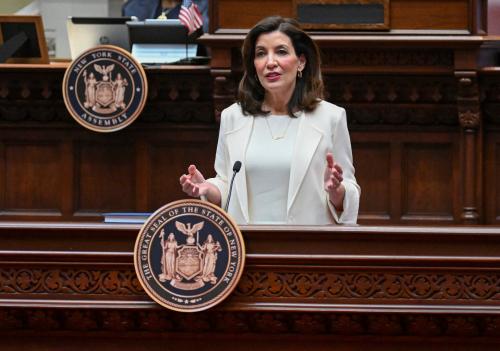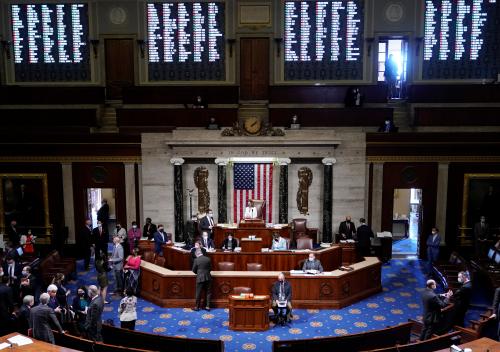The congressional primary season is underway. Some incumbent members are facing new voters after redistricting following the 2020 Census, while others are choosing to retire. According to data compiled by the House Press Gallery, 46 House members have announced that they will not run for re-election in November—30 Democrats and 16 Republicans; two additional Democrats have also recently indicated they are running for other office, bringing the total to 48. Of these, 17 (10 Democrats and 7 Republicans) are leaving their House seats to run for higher office, generally governor or the Senate. By comparison, this is a slightly lower number than the last midterm, which saw 34 Republicans and 18 Democrats leave the chamber—but higher than the post-WWII average through 2018 (35) and the last cycle immediately after redistricting, in 2012 (39).
Several decades of political science research offers some insight into why members choose not to run for re-election. Early work examining a large wave of retirements from the House in the 1970s highlighted an increased workload and greater fundraising responsibilities as making the job less attractive. More contemporary watchers of Congress offer a similar explanation, as members find themselves with little influence in a centralized chamber. Other research highlights the degree to which, in addition to these institutional changes, older members, those facing closer races, those with less seniority (and thus less influence), and those less like the typical member of their party ideologically were also more likely to retire between the 1960s and the mid-1990s. More recent work also suggests that Republicans may depart at higher rates because they “see government as ‘part of the problem’…[and] dislike having to support, expand, and administer government solutions.” Female members also appear to be more sensitive to a lack of influence in making their retirement decisions, and contextual factors—like the overall mood of the electorate—may play a role as well.
Supporters of congressional term limits often argue that turnover would bring new perspectives to Congress, but there are several reasons to be concerned about high levels of retirement from the chamber. One is that turnover creates learning curves for new members and, just like anyone entering a new job or role, more junior members may be less effective at their jobs. Research on the term limits imposed by House Republicans on their committee chairs, for example, suggests that chairs become more effective the longer they serve in those leadership positions. The return of congressionally-directed spending in 2021 provides another example of the challenges of retirements; many members who had not served in the House when members could make requests for specific projects prior to 2011 were left to navigate a system important to securing benefits for their constituents with which they had no prior experience.
Retirements of more experienced members can also have consequences of various kinds for particular blocs of members in the House, especially those for whom collective action is an important component of their influence. Of the 32 Democrats departing the House this year, eight are members of the Congressional Black Caucus. On one hand, this change means some of the most influential Black legislators will not return to advocate for the shared interests of the members of their communities—but on the other, it opens up the possibility of new and often more progressive class of Black lawmakers. Six retirements in the California delegation alone could also create opportunities for new legislators from historically underrepresented groups.
There is also reason to believe that, in the words of AEI’s Yuval Levin in testimony before the House Select Committee on Modernization, the House is attracting new members who “no longer see it as a mold of their character and behavior but just as a platform for themselves to perform on and raise their profiles and be seen.” This dynamic is especially concerning on the Republican side of the aisle, where, for example, freshman Rep. Madison Cawthorn (R-N.C.) boasted about centering his staff around communications rather than policy. While, based on an analysis of job titles, Cawthorn’s staff ultimately looked similar to the typical House member’s, the notion that messaging is the most important part of a member’s job is a concerning shift in the institution.
The evolution of the kind of Republicans who seek election to the House also stands to have governing consequences should the party take the majority in the 118th Congress. As Rep. Patrick McHenry (R-N.C.) recently explained when asked about his decision to forgo a run to become the GOP whip, or chief vote counter, next Congress, the party will have to fulfill several basic responsibilities of governing early on in their potential majority—votes for which getting support may be difficult. (McHenry is choosing to remain as the top Republican on the Financial Services Committee instead.) While retirements by longer-serving, more governing-oriented members are not the only cause of these prospective challenges, they have played a role, reminding us of the far-reaching consequences of individual decisions to leave the chamber.






Commentary
Why members of Congress choose not to run for re-election
May 12, 2022